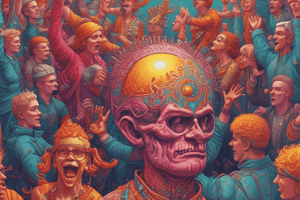Podcast
Questions and Answers
True or false: The dominant ideology refers to the widely accepted set of ideas in a society, usually imposed by a powerful group.
True or false: The dominant ideology refers to the widely accepted set of ideas in a society, usually imposed by a powerful group.
True (A)
True or false: Ideologies are sets of beliefs that explain various aspects of life, such as the meaning of life, family organization, and how societies should be organized and governed.
True or false: Ideologies are sets of beliefs that explain various aspects of life, such as the meaning of life, family organization, and how societies should be organized and governed.
True (A)
True or false: Marxists argue that ideologies can have a controlling or manipulative element, with the ruling class using institutions like the media and education system to impose their dominant ideology.
True or false: Marxists argue that ideologies can have a controlling or manipulative element, with the ruling class using institutions like the media and education system to impose their dominant ideology.
True (A)
True or false: According to Adorno and Horkheimer, the culture industry perpetuates ruling-class ideology through popular culture forms consumed actively by the people.
True or false: According to Adorno and Horkheimer, the culture industry perpetuates ruling-class ideology through popular culture forms consumed actively by the people.
True or false: Ideology can prevent the working class from realizing their true situation, resulting in what Marxists call 'false class consciousness.'
True or false: Ideology can prevent the working class from realizing their true situation, resulting in what Marxists call 'false class consciousness.'
True or false: Ideologies, as mental maps, provide structural roles in society, helping to contextualize events and guide economic, political, and cultural development.
True or false: Ideologies, as mental maps, provide structural roles in society, helping to contextualize events and guide economic, political, and cultural development.
True or false: Power is defined as the capacity to bring about change actively but not passively.
True or false: Power is defined as the capacity to bring about change actively but not passively.
True or false: Order maintenance involves only power and force, but not ideology or consensus.
True or false: Order maintenance involves only power and force, but not ideology or consensus.
True or false: Formal and informal social control, as well as socialization and nature, shape people's behavior.
True or false: Formal and informal social control, as well as socialization and nature, shape people's behavior.
True or false: The mechanisms through which order is maintained involve power, ideology, force, and consensus.
True or false: The mechanisms through which order is maintained involve power, ideology, force, and consensus.
True or false: Power can be measured in terms of decision-making, including the ability to make decisions, prevent others from making decisions, or removing decision-making from the agenda.
True or false: Power can be measured in terms of decision-making, including the ability to make decisions, prevent others from making decisions, or removing decision-making from the agenda.
True or false: Foucault argues that power is exercised in subtle ways, such as technological surveillance.
True or false: Foucault argues that power is exercised in subtle ways, such as technological surveillance.
True or false: Beliefs, such as gender norms, shape behavior and interactions between individuals.
True or false: Beliefs, such as gender norms, shape behavior and interactions between individuals.
True or false: The social construction of reality involves a complex relationship between beliefs, ideologies, power, and everyday ideas about roles, values, and norms.
True or false: The social construction of reality involves a complex relationship between beliefs, ideologies, power, and everyday ideas about roles, values, and norms.
True or false: Consensus is a functionalist perspective that believes order is maintained through a general agreement on a set of values, and it is not imposed by a ruling class.
True or false: Consensus is a functionalist perspective that believes order is maintained through a general agreement on a set of values, and it is not imposed by a ruling class.
True or false: Collective rituals and symbols, like religious ceremonies or national anthems, can reinforce the consensus among society members.
True or false: Collective rituals and symbols, like religious ceremonies or national anthems, can reinforce the consensus among society members.
True or false: The consensus can change over time if opinion within society changes, leading to changes in rules and laws.
True or false: The consensus can change over time if opinion within society changes, leading to changes in rules and laws.
True or false: Despite changes, societies can remain stable through adapting the consensus.
True or false: Despite changes, societies can remain stable through adapting the consensus.
True or false: The text suggests making a list of reasons why school students conform to encourage conformity.
True or false: The text suggests making a list of reasons why school students conform to encourage conformity.
True or false: The specific strategies to increase conformity among school students are provided in the text.
True or false: The specific strategies to increase conformity among school students are provided in the text.
Power can only be categorized into force or coercive power, and consensual power (authority)
Power can only be categorized into force or coercive power, and consensual power (authority)
Consensual power can be divided into charismatic power, traditional power, and rational/legal power
Consensual power can be divided into charismatic power, traditional power, and rational/legal power
Power can be measured in terms of decision-making, including the ability to make decisions, prevent others from making decisions, or removing decision-making from the agenda
Power can be measured in terms of decision-making, including the ability to make decisions, prevent others from making decisions, or removing decision-making from the agenda
In modern societies, power has become transparent and easy to see, as people are fully aware of the power others have over them
In modern societies, power has become transparent and easy to see, as people are fully aware of the power others have over them
Foucault argues that power is exercised in obvious and overt ways, such as physical force and direct control
Foucault argues that power is exercised in obvious and overt ways, such as physical force and direct control
Knowledge and language do not contribute to belief systems that control behavior by influencing how individuals think about the world
Knowledge and language do not contribute to belief systems that control behavior by influencing how individuals think about the world
Beliefs, such as gender norms, do not shape behavior and interactions between individuals
Beliefs, such as gender norms, do not shape behavior and interactions between individuals
The social construction of reality involves a simple relationship between beliefs, ideologies, power, and everyday ideas about roles, values, and norms
The social construction of reality involves a simple relationship between beliefs, ideologies, power, and everyday ideas about roles, values, and norms
The consensus is a functionalist perspective that believes order is maintained through a general agreement on a set of values, which is imposed by a ruling class
The consensus is a functionalist perspective that believes order is maintained through a general agreement on a set of values, which is imposed by a ruling class
Collective rituals and symbols, like religious ceremonies or national anthems, cannot reinforce the consensus among society members
Collective rituals and symbols, like religious ceremonies or national anthems, cannot reinforce the consensus among society members
True or false: Foucault argues that power is exercised in subtle ways, such as technological surveillance.
True or false: Foucault argues that power is exercised in subtle ways, such as technological surveillance.
True or false: The social construction of reality involves a complex relationship between beliefs, ideologies, power, and everyday ideas about roles, values, and norms.
True or false: The social construction of reality involves a complex relationship between beliefs, ideologies, power, and everyday ideas about roles, values, and norms.
True or false: Beliefs, such as gender norms, shape behavior and interactions between individuals.
True or false: Beliefs, such as gender norms, shape behavior and interactions between individuals.
True or false: Consensus is a functionalist perspective that believes order is maintained through a general agreement on a set of values, and it is not imposed by a ruling class.
True or false: Consensus is a functionalist perspective that believes order is maintained through a general agreement on a set of values, and it is not imposed by a ruling class.
True or false: Collective rituals and symbols, like religious ceremonies or national anthems, can reinforce the consensus among society members.
True or false: Collective rituals and symbols, like religious ceremonies or national anthems, can reinforce the consensus among society members.
True or false: Despite changes, societies can remain stable through adapting the consensus.
True or false: Despite changes, societies can remain stable through adapting the consensus.
True or false: Ideology can prevent the working class from realizing their true situation, resulting in what Marxists call 'false class consciousness.'
True or false: Ideology can prevent the working class from realizing their true situation, resulting in what Marxists call 'false class consciousness.'
True or false: Beliefs, such as gender norms, do not shape behavior and interactions between individuals.
True or false: Beliefs, such as gender norms, do not shape behavior and interactions between individuals.
True or false: The consensus can change over time if opinion within society changes, leading to changes in rules and laws.
True or false: The consensus can change over time if opinion within society changes, leading to changes in rules and laws.
True or false: Ideologies, as mental maps, provide structural roles in society, helping to contextualize events and guide economic, political, and cultural development.
True or false: Ideologies, as mental maps, provide structural roles in society, helping to contextualize events and guide economic, political, and cultural development.
True or false: Ideologies are often seen as unbiased and impartial accounts and cannot be used to justify specific attitudes and behaviors.
True or false: Ideologies are often seen as unbiased and impartial accounts and cannot be used to justify specific attitudes and behaviors.
True or false: The culture industry perpetuates ruling-class ideology through popular culture forms consumed passively by the people according to Adorno and Horkheimer.
True or false: The culture industry perpetuates ruling-class ideology through popular culture forms consumed passively by the people according to Adorno and Horkheimer.
True or false: Power and its influence on society are defined as the capacity to bring about change actively or passively.
True or false: Power and its influence on society are defined as the capacity to bring about change actively or passively.
True or false: Ideologies, as mental maps, do not provide structural roles in society, contextualize events, or guide economic, political, and cultural development.
True or false: Ideologies, as mental maps, do not provide structural roles in society, contextualize events, or guide economic, political, and cultural development.
True or false: Formal and informal social control, as well as socialization and nature, do not shape people's behavior according to the text.
True or false: Formal and informal social control, as well as socialization and nature, do not shape people's behavior according to the text.
True or false: The dominant ideology refers to the widely accepted set of ideas in a society, usually imposed by a powerful group.
True or false: The dominant ideology refers to the widely accepted set of ideas in a society, usually imposed by a powerful group.
True or false: Marxists argue that ideologies can have a controlling or manipulative element, with the ruling class using institutions like the media and education system to impose their dominant ideology.
True or false: Marxists argue that ideologies can have a controlling or manipulative element, with the ruling class using institutions like the media and education system to impose their dominant ideology.
True or false: Collective rituals and symbols, like religious ceremonies or national anthems, cannot reinforce the consensus among society members.
True or false: Collective rituals and symbols, like religious ceremonies or national anthems, cannot reinforce the consensus among society members.
True or false: The consensus is a functionalist perspective that believes order is maintained through a general agreement on a set of values, which is not imposed by a ruling class.
True or false: The consensus is a functionalist perspective that believes order is maintained through a general agreement on a set of values, which is not imposed by a ruling class.
True or false: Despite changes, societies cannot remain stable through adapting the consensus.
True or false: Despite changes, societies cannot remain stable through adapting the consensus.
Flashcards are hidden until you start studying





